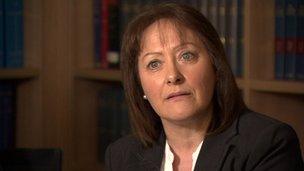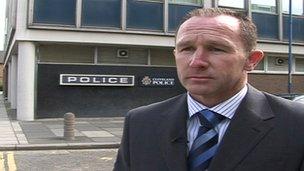Cleveland Police in huge damages payout to lawyer
- Published
James Watson is one of the best known defence solicitors in North Eastern England
Cleveland Police has agreed to pay £550,000 in damages after prominent defence lawyer James Watson was falsely imprisoned, BBC Newsnight has learned.
The unprecedented payout includes £80,000 in exemplary damages - the maximum possible amount.
The force admits falsely imprisoning Mr Watson and his family when the lawyer was arrested in 2009, wrongful interference with his belongings and trespass.
They also agreed to remove any vestige of suspicion from police records.
As part of its settlement agreement Cleveland Police have also accepted that they cannot defend against claims that the search warrants used to search Mr Watson's home and office were maliciously procured, or that officers' behaviour amounted to "misfeasance" - an abuse of power.
"The sum offered and accepted in this case was at the absolute maximum, there is no higher reward of exemplary damages that a court could make. And so that is the clearest recognition on the chief constable's part that the conduct of her officers was utterly indefensible," Mr Watson's lawyer Fiona Murphy said of the decision.
Mr Watson, one of the best known defence solicitors in the North East of England, was arrested when Cleveland Police raided his Middlesbrough home in June 2009.
He was held in a cell for almost 30 hours and questioned on suspicion of perverting the course of justice before being released on bail.
His wife Rita and their two sons were held in one room of their house for more than seven hours.
The house and his office were searched and documents - including sensitive papers protected by legal privilege - were seized.
Trial collapse
Cleveland Police launched their investigation into Mr Watson after their case against one of his clients collapsed. Bronson Tyers was convicted of conspiracy to kidnap but then acquitted in a retrial.
Mr Watson was suspected of being part of a conspiracy to make witnesses change their story. He was arrested but, despite a two-year investigation, never charged with any offence.

Police also admit Mr Watson's wife Rita and their two sons were falsely imprisoned
Newsnight has seen an Independent Police Complaints Commission (IPCC) report which is highly critical of the way Cleveland Police investigated Mr Watson and of the conduct of the officer in charge, Chief Inspector Anthony Riordan.
The report, written last year by a senior officer at West Yorkshire Police, says that Ch Insp Riordan behaved as if he was "hell bent on cornering his quarry", that his attention had become "focused unhealthily" on Mr Watson and that this had the effect of "clouding his judgement".
According to the IPCC, Ch Insp Riordan presented unsubstantiated evidence to a senior judge when he went to the Old Bailey to apply for warrants to search Mr Watson's property.
The judge was left with the impression that there were reasonable grounds to believe Mr Watson was involved in money laundering, which was untrue.
Warrant application
Ch Insp Riordan told Newsnight in a statement that it had been agreed "by senior individuals" that there would be an application for a joint warrant relating to Cleveland Police's investigation into perverting the course of justice and an investigation into money laundering by West Yorkshire Police.
He said that since he was not involved in the money laundering investigation he was reliant on West Yorkshire Police's officers that the application was in order and that Cleveland Police were "advised by counsel about the legality of the warrants and the proposed application before this was made".
Speaking about the incident Mr Watson said: "The shenanigans at the Old Bailey, as appalling as they may be to an outsider coming and looking at them for the first time, is the sort of behaviour Cleveland Police have been up to in small things and big for the bulk of my professional career."

Sensitive documents covered by legal privilege were among those seized by police
Ch Insp Riordan seized 26 boxes of documents from Mr Watson, including the documents covered by legal privilege.
The Crown Prosecution Service (CPS) said that, instead of incriminating Mr Watson, the documents exonerated him. However, Cleveland Police held onto the files for several months longer and continued to treat Mr Watson as a suspect.
Their precise motivation for this and other decisions made in the course of the investigation is unclear - officers involved were supposed to keep notes on decisions taken and the rationale behind them, but they failed to do so.
Nor, according to police, is there any recording of their custody interview with Mr Watson. They say that all six tapes and all six back-up tapes failed to record, though they blame this on mechanical failure and say that Mr Watson was not the only interviewee affected.
Full pension
Ch Insp Riordan issued a statement to BBC Newsnight over its report, saying: "I strongly refute any allegation that I acted with anything other than professionalism and integrity in connection with the arrest of Mr Watson.
"I have made a formal complaint about the conduct of the investigation carried out by West Yorkshire Police on behalf of the IPCC, and as that complaint is ongoing it is inappropriate for me to comment further."
Speaking to Newsnight about the case Mr Watson said: "What sticks in my throat is that millions of pounds have been wasted of taxpayers' money at a time of supposed austerity when public services are closing down hand over fist in Middlesbrough. Millions of pounds wasted and not one police officer held to account."
In the wake of their inquiry the IPCC recommended that Cleveland Police consider suspending Ch Insp Riordan.
Instead, he was retired on a full pension following a decision by Cleveland Police's Assistant Chief Constable Sean White, a man who knows Ch Insp Riordan personally as they were both on the police sailing team.
The IPCC has said that the decision not to suspend Ch Insp Riordan "sent out completely the wrong message".
Force under fire
Cleveland Police's new Chief Constable Jacqui Cheer has given BBC Newsnight a statement regarding the decision, saying:
"Assistant Chief Constable White considered the suspension in accordance with the policy and practices of the force and based solely upon the information and evidence presented to him by the investigation team."

Ch Insp Riordan says he was professional throughout the investigation
Ms Cheer went on to say that "ACC White decided that the conditions to justify suspension were not met" and that he strongly rejected any suggestion that his decision was based on anything other than the facts presented to him at the time.
Speaking to BBC Newsnight about the settlement agreement Mr Watson said: "The value of the payout is important because it reflects the fact that something must be done to reform Cleveland Police. It cannot be allowed to stagger on for another 20 years in the way that it has for the past 20 years."
The culture of the force has been at the centre of a long-running corruption investigation into Cleveland Police.
In October 2012, Sean Price became the first chief constable to be sacked for 35 years when he was dismissed for gross misconduct after he was found to have lied about his role in a recruitment matter and to have instructed a member of staff to lie.
In March 2013, deputy chief constable Derek Bonnard was also sacked for gross misconduct. And in February 2013 the IPCC said the head of finance, assistant chief officer Ann Hall, had been suspended amid an investigation into alleged misuse of public funds.
UPDATE 11 May 2013: James Watson says he rejects Ch Insp Riordan's explanation of how search warrants relating to money laundering charges were prepared and approved.
Zoe Conway's full report on this case was on BBC Newsnight on Friday 10 May 2013 at 10.30pm on BBC Two.